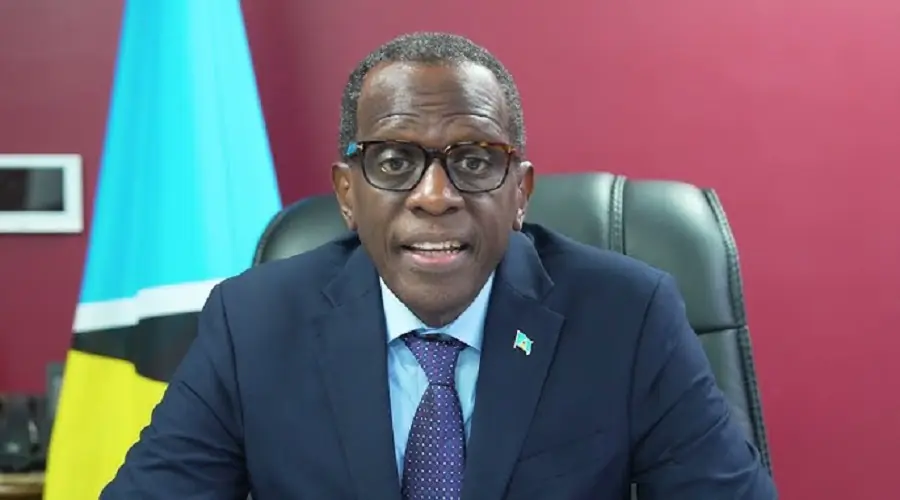HON. PHILIP J PIERRE PRIME MINISTER OF SAINT LUCIA EMANCIPATION DAY 2025
Good day, my fellow Saint Lucians,
After 191 years since the abolition of slavery, we have made much progress as African descendants in overcoming the inhumane treatment and psychological trauma imposed on our ancestors. This trauma has been carried across generations. And while its impact has been declining, its remnants continue to impede the progress of some of our people. The legacy of slavery is still able to divide us despite the common indignity suffered by our ancestors. And yes, there remain, sadly, a few among us who have yet to understand and appreciate the need to lift our people from self-doubt and the harmful effects of colonial values.
As we honour the sacred memory of our ancestors and the unbreakable spirit of those who rose from bondage to claim their freedom, we are not only looking back—we are reaching forward.
The bonds of global cooperation, once a beacon of hope, have been strained by division, distrust, and conflict. Yet, it is precisely now that we must recommit ourselves to unity, dialogue, and shared purpose.
The President’s Visit
The vilification and denigration of the President of Nigeria, Bola Tinubu, by a politically motivated group, tacitly supported by the opposition party, was another demonstration of the harmful effects of the legacy of slavery: self-hate and a readiness to accept African people and their descendants as inferior. That behaviour was nothing short of shameful and disgraceful. Had the visit been by a Head of State from another country, the reception from that group would have been at the very least respectful.
To the government and people of the Republic of Nigeria, the government and people of Saint Lucia have been honoured by the visit of your President and look forward to establishing and deepening economic, social and cultural ties with your country. I am pleased that during the visit of the President and his delegation, several memoranda of understanding (MOUs) were established for fostering economic, social, educational and cultural relations with Saint Lucia and the OECS. My administration will do its best to ensure that those MOUs bear fruit at the earliest opportunity.
Social and Enabling Support
My administration is mindful of its role in transforming society into a place where its citizens are proud of their heritage and history. We will continue to address the inhibiting social and economic pressures on vulnerable groups. This is why we remain committed to assisting those most in need, to reduce the gap between the haves and have-nots, so that we can move forward together as a nation with a shared history and destiny. We must not allow any group that still does not value and respect their history and heritage to distract us from the immense strides that have been made in reassuring our people that they are as good as any.
Our small nation continues to remind the world of the value of our people to the development of humanity. The athletic prowess of Julien Alfred is more than a celebration of Olympic gold and silver medals; it is a show of self-confidence, pride, and freedom, a freedom to think big and to inspire those who dare to succeed in the face of major challenges. This is in part why my administration remains committed to the development of the people, so that they can reach their true human potential.
African History
In the area of education, my administration, through the Ministry of Education, has taken steps to integrate African studies into the curriculum of secondary schools. The absence of contributions from African civilisation and the thinking of African philosophers in our school system is a gap that needs to be filled. In filling these gaps, our students are expected to have greater historical knowledge and cultural awareness, to develop a greater sense of self-worth and identity, and to build their academic curiosity and creativity through the exploration of African literature, music, politics, and philosophy.
If we are to achieve this, Saint Lucia will proudly be a leader in culturally relevant and progressive education in the Caribbean. The Ministry of Education has already engaged a consultant to develop a framework for the development of a curriculum for African studies. This framework will include, among other things, teacher training and a phased implementation plan to introduce African studies in all secondary schools.
The Middle Passage
For centuries, the Atlantic or Middle Passage was a site of unimaginable suffering and forced separation. Now, it must become a bridge—a bridge for a reconnection, and a renaissance. The recent strides in multilateral cooperation—from the Africa-CARICOM Summit to the AfriCaribbean Trade & Investment Forum (ACTIF) for building partnerships in trade, technology, and cultural exchange—are not just diplomatic gestures. They are a long-overdue reunion of a family separated by history but united by blood and purpose.
I was honoured to attend the recent ACTIF Conference held in Grenada from July 28-29,2025.
With over 1000 participants from Africa and the Caribbean, discussions centred around creating a free-trade zone, the establishment of direct air and sea links, and the possibility of regional integration between the two regions. The African continent, with its huge population, is expected to grow to 1.5 billion by 2050, offering exciting market opportunities for our nation. We must, therefore, position ourselves to make the most of it.
From the rhythms of our drums to the resilience of our people, Africa lives in us, not just as heritage, but as destiny. The time has come to transform cultural kinship into concrete cooperation in trade, investment, education, technology, tourism and the arts. Let us strengthen our ties not as distant relatives, but as equal partners in a shared journey of renewal.
Renewed call for Human Dignity
The transatlantic slave trade, the brutal and inhumane treatment of our African ancestors, must be addressed and understood if we are to fully appreciate its current impact on the social and economic inequalities in our society today. The legacy of slavery has left its scars, scars of self-hate and inferiority. Too many of our youth are looking for a sense of identity and affirmation, and are turning to gangs and violence. I say to young people, the violence and brutality of slavery have been abolished. The abolition of slavery has provided a new freedom, which calls upon you to respect human life and be productive citizens. Let us not return to killings and brutality as a means of settling conflict. We must appreciate and respect human life and teach our children to do likewise. As a peace-loving people, human life must be valued and respected. The dignity and human rights of all must be respected regardless of colour, creed or gender.
Conclusion
Together, Saint Lucia and Africa can be a powerful voice for climate justice, reparative action, and a future where our people can thrive. Our emancipation is not the end, but the beginning- a foundation on which we rise together, to forge new bonds of solidarity and a shared destiny for future generations.
Allow me to salute the pioneers in our country: the poets, writers, drummers, and other creatives and members of the Rastafarian society who, over the years, have reminded us of our African culture, heritage, and history. I thank you all.
My government has since August 2021 agreed to ensure that the significance of Emancipation Day is celebrated and commemorated with a month-long celebration as a reminder of our resilience as a people seeking to improve our quality of life.
Happy Emancipation Day to all. I thank you



